
 In 2005, the centenary of the birth of Mary Meylak (or Meilak), the first woman poet in the Maltese language, a mass was held in her honor in St George's Baslilica, St George's Square, Gozo, Malta. Attending were the President of Malta, Dr Edward Edward Fenech Adami, and the Bishop of Gozo, Mgr Nicholas J Cauchi, headed the congregation. Meylak - who preferred that name to Meilak - was of the parish of St George.
In 2005, the centenary of the birth of Mary Meylak (or Meilak), the first woman poet in the Maltese language, a mass was held in her honor in St George's Baslilica, St George's Square, Gozo, Malta. Attending were the President of Malta, Dr Edward Edward Fenech Adami, and the Bishop of Gozo, Mgr Nicholas J Cauchi, headed the congregation. Meylak - who preferred that name to Meilak - was of the parish of St George.
After mass, a bronze plaque of Meylak mounted on a large marble tablet was unveiled on the opposite side of the square to the basilica. The proposal to erect the monument, which joined a pre-existing one of Monsignor Giuseppe Farrugia, was encouraged by Meylak's nephew, Canon Joe Mejlak, and the bronze likeness was made by artist Joseph Chetcuti, and the marble and engraving by A.F. Ellis (Marble) Works Ltd of Gozo. The image represented is of the Romantic poet in her youth, and the plaque bears some of her verses.
Dun Karm (1871-1961) was born Carmelo Psaila in Żebbuġ, Malta. He was the national poet of Malta and has been called 'the Bard of Malta'. He became a priest at 23, then worked as a seminary lecturer and diocesan grammar-school teacher, and retired in 1936 after 15 years as Assistant Director at the National Library in Valletta.
He also wrote an English-Maltese dictionary, and his poetry has been translated into English, Spanish and French.
He wrote the lyric to Robert Samut's music Innu Malti ('Hymn of Malta'), which is the national anthem, and is considered instrumental in Maltese being adopted as the national language, which was in 1932.
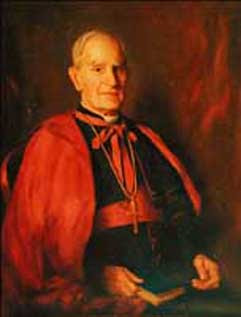 A painting of Dun Karm by E. Caruana Dingli.
A painting of Dun Karm by E. Caruana Dingli.

 Dun Karm's statue stands in the market place at Żebbuġ.
Dun Karm's statue stands in the market place at Żebbuġ.
 Dun Karm was born on Triq il-Parroċċa.
Dun Karm was born on Triq il-Parroċċa.

 The house of his birth bears a plaque.
The house of his birth bears a plaque.


 Malta shows great appreciation for its poets, and the streets above commemorate Dun Karm. The street below, the equivalent of 'Poetry Street', would perhaps be unimaginable in England.
Malta shows great appreciation for its poets, and the streets above commemorate Dun Karm. The street below, the equivalent of 'Poetry Street', would perhaps be unimaginable in England.

Below is a link to a photo taken in Msida several years ago.
–––––––––––––––––––––––––––––––––––
Dun Karm in Msida, Malta
Ġorġ Pisani (1909-99) was born in Victoria, Gozo, his father being a successful wine merchant.
During adolescence he became a novice with an order of Capuchin Francisan friars, studied literature and theology there, and began writing poetry seriously, having some poems published in the Maltese Capuchin Franciscan magazine The Immaculate.
Pisani left the order to become a teacher, and in 1935 became the first headteacher of the Liceo on Gozo. During the war he worked for the Department of Information as a translator and as a co-editor of Information Service Bulletin.
After the war he returned to teaching at the Liceo while still working for the Department of Information, and is seen as one of the pioneers of Gozitan broadcasting.
In The Literature of Malta: An Example of Unity in Diversity, Arnold Cassola says that he gained the title 'Il-poeta ta' l-istorja u l-preistorja ('The poet of history and pre-history'), although he believes that this is too limited a description, as 'Pisani is trying to highlight the collective symbology and imagery of the Maltese and Gozitan society of today, thus bringing out that link of continuity which connects the past to the present.' He therefore sees Pisani's poetic work as 'a pilgrimage into the hazy past, having the present as a clear point of departure, rather than departing from the past to get to our days.'
Cassola also states that at the same time as Gozo is a deeply Catholic country, it retains its links with the pagan past. Il-Ghid taż-Żgħożija is perhaps badly translated as 'The Easter Sugar Youth', but - faute de mieux - it will have to suffice. This is title of the opening poem of a collection published in 1945, and it begins almost in bacchanalian fashion:
'Let’s all drink lost
In a dream of enjoyment,
Before the loss forever
Of the spark of youth.
Wine is inviting us
To joy and revelry,
In its contentment we forget
Sorrow and all worry.'
But as the poem celebrates youth and the energy of pagan times, linked with the past is also the progress that now exists in the present, and will continue into the future. And of course the red of the wine also has Christian associations. Gozo is noted for its wine, a drink which retains a profound importance among the people of the island.
In all, Pisani published eight books of poetry, six plays, a collection of short stories, and two novels.
Two years after his death, a bronze statue of him was placed in Main Gate Square, by the bus terminal in Victoria. In his left hand is a copy of Il-Ghid taż-Żgħożija. It is the work of the Gozitan artist Alfred Camillieri Cauchi.

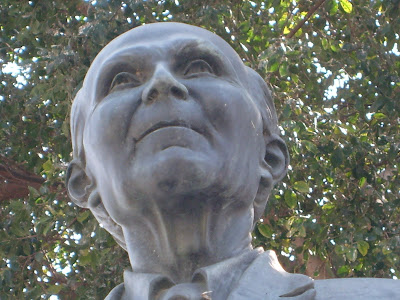


.jpg)
The Herbert Ganado Gardens remember the writer of the same name, and are in Floriana just outside of Valletta, Malta. Ganado (1906-75) is in some respects the exact opposite of Manwel Dimech. He was born in Floriana and was a lawyer as well as an editor and an author. He studied at the Liceo and the University of Malta, and became a lawyer in 1931. He also became the head of Catholic Action, a group of lay Catholics trying to encourage the influence of Catholism.
The Catholic newspaper Lehen is-Sewwa began in 1928, but was in severe financial trouble within five years, and looked to Catholic Action for support. Ganado became its third editor and increased the scope of the paper, including far broader subjects, and turned it into a daily.
However, Ganado wrote a series of articles supporting Francisco Franco during the Spanish Civil War, and it was of course assumed by the British colonial powers in Malta that he had fascist sympathies, and - an odd similarity with Dimech here - he was exiled to Africa (Uganda in this case).
His best known written work is Rajt Malta Tinbidel, (trans. My Century, which is a four-volume book of his memoirs.

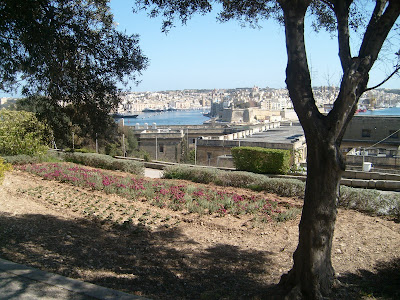

Coleridge went to Malta both because of the better climate and to try to cure himself of his addiction to opium.
 He arrived 18 May 1804 on the merchant ship Speedwell - carrying 84 cannons to be delivered to Trieste - and walked up the long, steep, narrow Old Bakery Street in Valletta. Photos here give a vague idea of what this walk would have been like. Coleridge's friend Dr John Stoddart was the King's Advocate there, and he had encouraged him to go to Malta. At the top of Old Bakery Street was Casa de St Foix, where Stoddart lived.
He arrived 18 May 1804 on the merchant ship Speedwell - carrying 84 cannons to be delivered to Trieste - and walked up the long, steep, narrow Old Bakery Street in Valletta. Photos here give a vague idea of what this walk would have been like. Coleridge's friend Dr John Stoddart was the King's Advocate there, and he had encouraged him to go to Malta. At the top of Old Bakery Street was Casa de St Foix, where Stoddart lived.



 Coleridge first stayed at the Casa de St Foix, which looked out onto Marsamxett harbor.
Coleridge first stayed at the Casa de St Foix, which looked out onto Marsamxett harbor.
He met the governor of Malta, Sir Alexander Ball, 20 May. Ball's aim was for Britain to permanently occupy Malta and Sicily in order to control sea routes, and sometime in June he had enrolled Coleridge to help him in his secret endeavors. His job was to write papers such as 'The French in the Mediterranean', which was sent to Nelson, and others - 'Algeria', 'Malta', 'Egypt' and 'Sicily' - were sent to Downing Street. Some weeks before this, Ball had become convinced about Coleridge's ability, and installed him in his palace on a salary 6 July. He began to eat well exercise well, and in general help to alleviate his addiction.
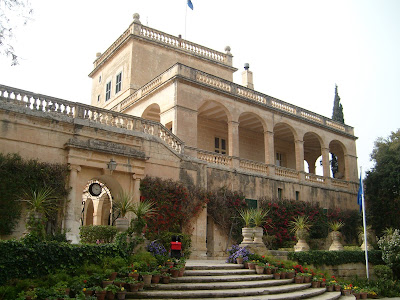 Ball's summer residence - now the President of Malta's official residence - was at St Anton(io), some miles inland from Valletta.
Ball's summer residence - now the President of Malta's official residence - was at St Anton(io), some miles inland from Valletta.
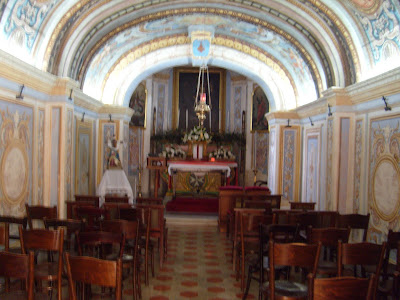 The chapel near the entrance to the palace.
The chapel near the entrance to the palace.
 The statue outside the palace.
The statue outside the palace.
 And some photos of the extensive palace gardens, where Coleridge delighted in the plants and the wildlife, such as the lizards.
And some photos of the extensive palace gardens, where Coleridge delighted in the plants and the wildlife, such as the lizards.
.jpg)


 The Public Secretary of Malta died 18 January 1805, and Coleridge accepted the job of acting Public Secretary while Ball awaited the official new one, receiving a salary of £600 a year.
The Public Secretary of Malta died 18 January 1805, and Coleridge accepted the job of acting Public Secretary while Ball awaited the official new one, receiving a salary of £600 a year.
Initially Coleridge was very happy, but as rumors came of problems in the home he had left in England, he dosed himself at night with opium and spirits, began having sexual fantasies and became preoccupied with unconventional erogenous zones. But the many pages of his Notebooks on many other subjects continued, as did his public duties.
However, he learned at the end of March of the death of his friend John Wordsworth, William's brother, and was ill for two weeks.
It is probably while in San Antonio that Coleridge wrote this poem to 'Asra' (Sara Hutchinson), which he lost and re-wrote later:
THE BLOSSOMING OF THE SOLITARY DATE-TREE
I
Beneath the blaze of a tropical sun the mountain peaks are the Thrones of Frost, through the absence of objects to reflect the rays. `What no one with us shares, seems scarce our own.` The presence of a ONE,
The best belov`d, who loveth me the best,is for the heart, what the supporting air from within is for the hollow globe with its suspended car. Deprive it of this, and all without, that would have buoyed it aloft even to the seat of the gods, becomes a burthen and crushes it into flatness.
II
The finer the sense for the beautiful and the lovely, and the fairer and lovelier the object presented to the sense ; the more exquisite the individual`s capacity of joy, and the more ample his means and opportunities of enjoyment, the more heavily will he feel the ache of solitariness, the more unsubstantial becomes the feast spread around him. What matters it, whether in fact the viands and the ministering graces are shadowy or real, to him who has not hand to grasp nor arms to embrace them ?
III
Hope, Imagination, honourable Aims,
Free Commune with the choir that cannot die,
Science and Song, delight in little things,
The buoyant child surviving in the man;
Fields, forests, ancient mountains, ocean, sky,
With all their voices--O dare I accuse
My earthly lot as guilty of my spleen,
Or call my destiny niggard ! O no ! no!
It is her largeness, and her overflow,
Which being incomplete, disquieteth me so!
IV
For never touch of gladness stirs my heart,
But tim`rously beginning to rejoice
Like a blind Arab, that from sleep doth start
In lonesome tent, I listen for thy voice.
Belovéd ! `tis not thine ; thou art not there!
Then melts the bubble into idle air,
And wishing without hope I restlessly despair.
V
The mother with anticipated glee
Smiles o`er the child, that, standing by her chair
And flatt`ning its round cheek upon her knee,
Looks up, and doth its rosy lips prepare
To mock the coming sounds. At that sweet sight
She hears her own voice with a new delight ;
And if the babe perchance should lisp the notes aright,
VI
Then is she tenfold gladder than before!
But should disease or chance the darling take,
What then avail those songs, which sweet of yore
Were only sweet for their sweet echo`s sake?
Dear maid ! no prattler at a mother`s knee
Was e`er so dearly prized as I prize thee:
Why was I made for Love and Love denied to me?
Coleridge left Malta 4 September 1805.
 This backstreet is tucked out of the way in Gżira, although I'm not aware of any of the man's connections with the town. In general, though, Coleridge is not publicly remembered in Malta - perhaps because he was in fact a spin doctor working for the British, dispensing propaganda in order to win support from the Maltese?
This backstreet is tucked out of the way in Gżira, although I'm not aware of any of the man's connections with the town. In general, though, Coleridge is not publicly remembered in Malta - perhaps because he was in fact a spin doctor working for the British, dispensing propaganda in order to win support from the Maltese?
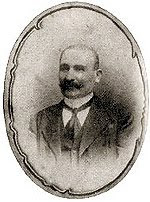 Manwel Dimech (1860-1921) is something of a hero in Malta, which by first appearances might seem a little strange for a person who, at a young age, was imprisoned for theft on eight occasions, and then, at the age of 17, sentenced to 20 years imprisonment for murder. But then, most things about Dimech's life are exceptional.
Manwel Dimech (1860-1921) is something of a hero in Malta, which by first appearances might seem a little strange for a person who, at a young age, was imprisoned for theft on eight occasions, and then, at the age of 17, sentenced to 20 years imprisonment for murder. But then, most things about Dimech's life are exceptional.
Dimech was born on 25 December 1860 in a slum dwelling in Triq San Ġwann, Valletta, where his family lived in one room, and the small building housed 60 people. The family moved house a few times before his father died at 37, leaving his mother to cope with a family of 10 children. Just two weeks after his father's death, in 1874 and at the age of 13, Dimech was imprisoned for his first theft. This established a pattern - petty theft and brief imprisonment - that would continue until his murder trial in 1878. Dimech left prison in 1890, only to return a few months later for counterfeiting money. Eventually, in July 1897, he was released at the age of 36, after spending 20 years in imprisonment.
Dimech had been illiterate before going to prison, but while there he educated himself and read promiscuously, teaching himself Maltese, English, French and Italian. At the beginning of 1898 he started his own language school, and published a weekly newspaper - Il-Bandiera tal-Maltin (The Flag of the Maltese) - as a voice for the oppressed, in which he criticized, among many other things, the abuse of prisoners, the strength of the Catholic Church, the oppression of the working classes, and campaigned for free education for all. He also wrote two books on language learning.
In 1904 he wrote a revolutionary novel, Ivan u Prascovia, about two Russian lovers under the Tzarist regime, although part of it was lost and it was published unfinished.
In 1911 he founded the philanthropic association Xirca tal-Imdawwlin (The Society of the Enlightened) - renamed Xirka Maltija - whose aim was to encourage support for his ideas on social reform. For a number of reasons - advocating the emancipation of women and criticizing the clergy among them - Dimech was excommunicated in the same year, and in 1914 the (British colonial) Maltese government arrested and exiled him for life for 'agitating the Dockyard workers against the government because he had anticlerical and socialist principles'. He left behind his wife and three children in Malta, and died a prisoner in Alexandria, Egypt, in 1921.
As a writer, he is probably remembered more for his journalism, although he also wrote two novels and some poetry. Unfortunately, nothing has been translated into English.
A statue of Manwel Dimech now stands prominently in Valletta in front of the Kastilja. Several streets and a bridge have also been named after him.


 Dimech's statue stands prominently among trees in front of the Kastilja in Valletta.
Dimech's statue stands prominently among trees in front of the Kastilja in Valletta.
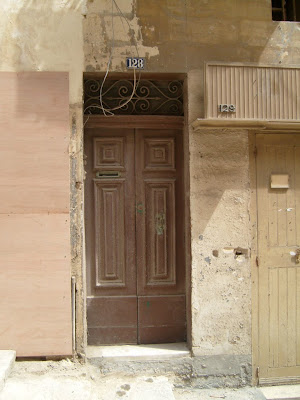 Dimech's birthplace, 128 Triq San Gwann, Valletta.
Dimech's birthplace, 128 Triq San Gwann, Valletta.
 And a broader view of the house and general environment, with Grand harbour in the background.
And a broader view of the house and general environment, with Grand harbour in the background.
 Dr. Mark Montebello, a Dominican friar, is Dimech's biographer, and also wrote a much more comprehensive book called, simply, Dimech. He has done a large amount of work regarding the interests of prisoners on Malta.
Dr. Mark Montebello, a Dominican friar, is Dimech's biographer, and also wrote a much more comprehensive book called, simply, Dimech. He has done a large amount of work regarding the interests of prisoners on Malta.

 This is just the kind of eccentricity that appeals to me. Eugene Schieffelin, a wealthy drug manufacturer, intended to introduce into the States all the birds mentioned in the works of Shakespeare. He was unsuccessful in that some species just didn't take to the country, but with the starling it was a very different story.
This is just the kind of eccentricity that appeals to me. Eugene Schieffelin, a wealthy drug manufacturer, intended to introduce into the States all the birds mentioned in the works of Shakespeare. He was unsuccessful in that some species just didn't take to the country, but with the starling it was a very different story.
In 1890 and 1891, Schieffelin released a total of 100 starlings in Central Park, and his introduction of the bird into the country became so successful that the starling is now a pest.
On 1 September 1990, 100 years after the initial release of the starlings, the New York Times published an article on the story, and this is one of the paragraphs:
'By 1928 [starlings] were found as far west as the Mississippi. By 1942 they were in California. By the mid-1950's they numbered more than 50 million. Schieffelin's mission had become more appropriate to a work of Hitchcock than of Shakespeare.'
As I don't have an image of a starling, here's one of a female chaffinch. Originally I'd assumed that Eugene Schieffelin hadn't introduced the chaffinch, but in fact he had, as Dr Robert DeCandido kindly points out in a comment below. 'A List of Birds in Shakespeare', which has links to the quotations and includes two of the finch, is here.
 A large sign on the fascia of the wine shop Weavers on the corner of Lister Gate and Castle Gate, Nottingham, England, remembers the site of the family business of the writer Geoffrey Trease - who is described as an 'innovative children's author'.
A large sign on the fascia of the wine shop Weavers on the corner of Lister Gate and Castle Gate, Nottingham, England, remembers the site of the family business of the writer Geoffrey Trease - who is described as an 'innovative children's author'.
Trease wrote his first novel, Bows Against the Barons, in 1934. This adapted the story of Robin Hood from a particularly left-wing perspective. The protagonist Dickon is a 16-year-old peasant from Oxton, Nottinghamshire, who meets Alan-a-Dale, which leads to his being introduced to Robin Hood's band, fights by the downtrodden peasants against their rich masters, and the death of Robin Hood and Dickon leaving to continue the struggle in Derbyshire in the end. The initial response to the all-too-obvious propaganda was generally lukewarm, although Trease achieved quite a success in the Soviet Union, where he spent five months in 1935. He later revised some of the wording - such as 'workers' and 'comrades' - in later editions.
Nevertheless, Bows Against the Barons is important in that it - along with Trease's later more politically subdued fiction - represents a move away from the traditional children's fiction of, for instance, G. A. Henty, with its emphasis on the importance of empire. In the fiction of the past, women had been in the background, whereas Trease placed them on a more equal footing, and his research into his subjects put the stress on realism. In a word, Trease contributed a great deal toward the democratization of modern children's historical fiction.
 The poet Robert Millhouse has been mentioned here before when I detailed the writers remembered at Nottingham Castle, although I didn't say anything of his grave in the General Cemetery, Nottingham, Canning Circus, against the Talbot Street wall. Finding the grave of Millhouse - who lived in Walker Street, Sneinton, Nottingham, in a house demolished some time ago - was not difficult, but removing the layers of ivy from it was, and the stone is showing some signs of deterioration.
The poet Robert Millhouse has been mentioned here before when I detailed the writers remembered at Nottingham Castle, although I didn't say anything of his grave in the General Cemetery, Nottingham, Canning Circus, against the Talbot Street wall. Finding the grave of Millhouse - who lived in Walker Street, Sneinton, Nottingham, in a house demolished some time ago - was not difficult, but removing the layers of ivy from it was, and the stone is showing some signs of deterioration.
 The gravestone records that he wrote the poems 'The Destinies of Man', 'Sherwood Forest', 'The Song of the Patriot', and 'Blossom'. The following verse of Spencer T. Hall's is written at the bottom:
The gravestone records that he wrote the poems 'The Destinies of Man', 'Sherwood Forest', 'The Song of the Patriot', and 'Blossom'. The following verse of Spencer T. Hall's is written at the bottom:
'When Trent shall flow no more and blossoms fail
On Sherwood's plains to scent the springtide gale;
When the lark's lay shall lack its thrilling charm,
And song forget the Briton's soul to warm:
And love o'er youthful hearts hath lost its sway,
Thy fame, O Bard, shall pass - but not till then - away.'
 Harp and laurel wreath.
Harp and laurel wreath.
Writers and literary associations in Nottingham General Cemetery:
–––––––––––––––––––––––––––––––––––
Robert Goodacre (1777–1835)
Ruth Bryan (1805–1860)
Sarah Ann Agnes Turk (1859–1927)
Annie Matheson (1853–1924)
Josiah Gilbert (1814–1892)
Anthony Hervey (c. 1796–1850)
Charles Bell Taylor (1829–1909)
James Prior's Parents
Ann Taylor (1782–1866)
Henry Hogg (1831-74)
 The title of Jean-Marc Roberts's novel, Les Seins de Blanche-Neige (or 'Snow White's Breasts'), is a symbol of the loss of innocence, when experience begins to encroach on children's territory, and a first sign of that may be something like drawing breasts on a picture of Snow White. But for the protagonist father François, such an act that presages this loss of innocence is a thing of darkness and fatality. As his daughter Tracy says:
The title of Jean-Marc Roberts's novel, Les Seins de Blanche-Neige (or 'Snow White's Breasts'), is a symbol of the loss of innocence, when experience begins to encroach on children's territory, and a first sign of that may be something like drawing breasts on a picture of Snow White. But for the protagonist father François, such an act that presages this loss of innocence is a thing of darkness and fatality. As his daughter Tracy says:
'Children no longer dream of the same games, of the same sweetness. Their dreams change color, smell, and size. They have grown up. They escape from us and lose their child status.'
And as a result of this change, the child-like father François must leave his family. As he has done four times, through four children, and four wives.
The story is told by each of the four children - now become four wounded adults - with four different versions of the events that link them and their father - who gradually seems increasingly sick as the tale generally moves back in time, from the youngest to the eldest child. François concludes the novel with an inconclusive letter to one of his children, although he is incapable of deciding which of them should receive it.
 Julien Green's parents were American – his mother Anne being from Savannah, Georgia, and his father Edward from Virginia – although he was born in Paris and his published works are almost exclusively in French. (1)
Julien Green's parents were American – his mother Anne being from Savannah, Georgia, and his father Edward from Virginia – although he was born in Paris and his published works are almost exclusively in French. (1)
His mother was an Episcopalian in horror of the body, and on one occasion, when Julian – as his name was originally spelt – was discovered masturbating in bed at the age of about five by his sister Mary, his mother brandished a bread knife in front of his penis and threatened to cut it off.
Understandably, this episode had a lasting effect on Green, shaping 'A terrifying idea of purity [...] in me.' His mother also forced him to undress in the dark so he would not see his naked body. When he joined the American Field Service in 1917, his workmates mocked him for not joining in their extracurricular drinking and womanizing activities. And at that time, Green would not even sit down on a recently vacated seat, such was his horror of coming into contact with the warmth of a person's body. Green – who had converted to Catholicism a few years before this – later discovered that he was homosexual, which generated more inner conflict which would be referred to in many of his works.
In Julien Green: Religion and Sensuality (2), Anthony H. Newbury notes that on 21 May 1949, Green recorded in his Journal that as he read Kierkegaard's Fear and Trembling he felt as if he had been struck by a thunderbolt: Kierkegaard says faith is 'the highest passion' in a man, and for Green faith is so deep that it colors everything, both good and evil. A few months later Green read W. N. P. Barbellion's The Journal of a Disappointed Man (3), and identified with what Barbellion calls 'this savage beast that dwells in us and eats us from the inside'. Green notes that he put some of Barbellion's words in the mouth of Joseph Day, his troubled protagonist in Moïra, who sees two conflicting forces – the spiritual and the sexual, each trying to cut the other's throat – at the heart of the human condition.
Green says of Moïra: 'How could I fail to see that it's a transposition of my own story? The eternal stuggle against oneself.' Joseph is a very pious university student who is mocked by his fellow students because he doesn't drink or frequent brothels. We learn nothing of the Moïra of the title, apart from the fact that she smokes, until the second part of the book, almost halfway into it. Moïra is the adopted daughter of his landlady, and during the vacations she sleeps in the bed he has been sleeping in. Joseph is troubled by this news, and no longer wants to sleep in the bed. Even when he changes lodgings he is disturbed by sexual longing, and sleeps on the floor to cause himself discomfort.
It is not difficult to see Joseph as a classic case of Sartrian self-deception (equals mauvaise foi), or, perhaps more accurately, Freudian: a fascist internal police force fighting the perceived crimes of a rampant id.
(1) His paternal grandfather, Charles Green, from Halsowen, England, was a cotton magnate who owned Green-Meldrim House, 14 West Macon Street, Savannah, which was built in 1861 and is a now National Historic Landmark.
(2) Amsterdam: Rodopi, 1986.
(3) London: Chatto & Windus, 1923.

 In 2005, the centenary of the birth of Mary Meylak (or Meilak), the first woman poet in the Maltese language, a mass was held in her honor in St George's Baslilica, St George's Square, Gozo, Malta. Attending were the President of Malta, Dr Edward Edward Fenech Adami, and the Bishop of Gozo, Mgr Nicholas J Cauchi, headed the congregation. Meylak - who preferred that name to Meilak - was of the parish of St George.
In 2005, the centenary of the birth of Mary Meylak (or Meilak), the first woman poet in the Maltese language, a mass was held in her honor in St George's Baslilica, St George's Square, Gozo, Malta. Attending were the President of Malta, Dr Edward Edward Fenech Adami, and the Bishop of Gozo, Mgr Nicholas J Cauchi, headed the congregation. Meylak - who preferred that name to Meilak - was of the parish of St George.













.jpg)












.jpg)



















